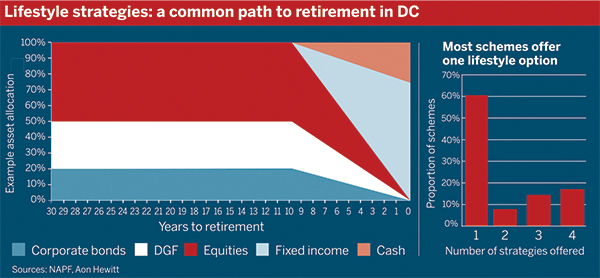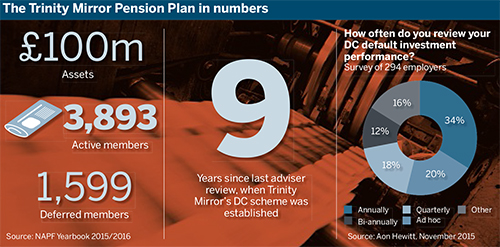Year in Review: It was a massive year for defined contribution, with new pension flexibilities, the subsequent government guidance promise and of course the charge cap to contend with.
As such, readers were hungry for case studies showing how other schemes were responding to these challenges, as well as commentary on how to meet the needs of those members who are nearing retirement amid all this upheaval.
And that hasn’t changed…
Guidance questions leave employers wavering on workplace education
January 15
In January, industry experts reported doubts among employers over the effectiveness of the government’s guidance guarantee – which later developed into Pension Wise – but they also predicted the service could act as a catalyst for employers to review their financial education programmes.
Jonathan Watts-Lay, director at corporate benefits adviser Wealth at Work, said it had been “overwhelmed” with enquiries from employers concerned that their staff would not be fully prepared for retirement.
With flexibility comes responsibility. I would like to think the guidance guarantee would be used by all parties as a kind of sense check
David Piltz, Buck Consultants
He said: “The one good thing about the guidance guarantee is that it’s acted as a catalyst for companies to say, ‘Hold on a minute, we’ve never really got our financial education programme off the ground – we’re not really sure the guidance guarantee is going to do it, but it has made us think we should be doing it ourselves as an employer’.”
Watts-Lay added members could be left “in limbo” by the guidance, as many conversations will end with the member having to go back to their employer to get further information.
But David Piltz, head of trustee services at Buck Consultants, said at the time the firm was in the process of developing tools for its clients’ members approaching retirement.
“With flexibility comes responsibility,” he said, adding that increased financial education or online tools in the workplace should not take the place of guidance from the government.
He said: “I would like to think the guidance guarantee would be used by all parties as a kind of sense check.”
Jaguar Land Rover drives down DC charges by a tenth as cap bites
February 9
Carmaker Jaguar Land Rover cut its defined contribution scheme charges by 10 per cent as the 0.75 per cent fees cap pushed down costs for pension savers in default funds from April.
Providers reviewed their products in light of the cap, which in turn empowered those schemes looking to control costs for their members.
Jaguar has negotiated a 10 per cent reduction in the investment management and administration charges for your individual pension account. We will continue to look for opportunities to improve value for money
Jaguar Land Rover
In a newsletter to members, the Jaguar scheme said: “JLR has negotiated a 10 per cent reduction in the investment management and administration charges for your individual pension account. We will continue to look for opportunities to improve value for money.”
Andrew Cheseldine, partner at consultancy LCP, said many in the industry were expecting the charge cap to come down further, causing schemes to try to compress costs even more.
“The charge cap is concentrating minds,” he said. “Some trustees I work with are aiming for 60bp. There may be pressure on the charge cap to come down further.”
But the downward pressure on charges was not seen as inevitable. Girish Menezes, then head of pensions administration at Buck Consultants, said charges could rise in the future.
“A year or two ago there was a lot of focus [on charges] and there was a dash to the bottom,” he said. “Because of the new DC flexibilities… people are looking at good quality of service and the flexibility of the offering.”
Aon lifestyling failure leaves members exposed to risk assets
February 26
Earlier this year we reported that members of 20 defined contribution schemes were exposed to risk assets for up to four years longer than intended after an administration error delayed those schemes’ lifestyling strategies.
DC lifestyling strategies typically begin to derisk members around 10-15 years before retirement, moving investments from equities into safer assets such as bonds and cash.
But consultancy Aon Hewitt has confirmed some members of schemes it administered had been left exposed for up to four years, risking market hits to savers’ pension pots, with the earliest case discovered starting in 2011.

The issue was originally brought to Aon’s attention late last summer. An average of roughly 100 members in each scheme had been affected.
An Aon spokesperson said at the time it had been working with clients on remediating issues where necessary. “We are aware of the issue with certain DC schemes administered from the Glasgow office and are working actively to correct it,” the spokesperson said.
“Our prime objective is to make certain that scheme members are not affected financially, and as a result we are undertaking a thorough review in order to make certain that this is the case.”
The incident highlighted the cost of putting DC administration errors right.
Ian McQuade, client director at governance specialists Muse Advisory, said rectifying the issue would have to be done on a case-by-case basis, as the process will be determined by what is written into each scheme’s contract with the administrator. But he said the cost of resolving the initial problem is likely to be more than any compensation.
Is 55 too young to cash in a DC pension?
May 20
The age at which members can access their pension pots should be increased, according to a law firm’s white paper, but some experts argued those in ill health should not be held back from drawing their cash at age 55.
The risk of retirees running out of money has been flagged as a concern for both savers and employers.
If you think about state pension age as going up to 67, and the cash-out age is about 10 years before that, [it] gives the impression 57 is an okay age to cash out
Francois Barker, Eversheds
The Eversheds paper laid out 10 key recommendations on pensions policy, of which one called on the government to “consider the case for increasing the age at which individuals can access their pension savings flexibly”.
Francois Barker, partner at Eversheds, said such a move would help inculcate a more realistic idea of when people can afford to retire.
“The idea behind this was, if you think about state pension age as going up to 67, and the cash-out age is about 10 years before that, [it] gives the impression 57 is an okay age to cash out,” said Barker.
However while Darren Philp, head of policy at mastertrust The People’s Pension, said it was “fair” the age should increase as life expectancy rises, he added the rules would have to be assessed to ensure people were not prevented from accessing their savings if they faced health problems.
Philp said the access age should remain lower than the state pension age. He added: “You need to be aware of the fact different regions have different life expectanc[ies].”
Trinity Mirror reviews advisers ahead of DC default appraisal
November 15
Trinity Mirror Pension Plan has carried out a consultant review ahead of an appraisal of its defined contribution default fund, spurred by the introduction of the freedom and choice reforms.
The end of the effective requirement to buy an annuity at retirement has sparked debate about the ideal investment strategy for DC defaults, as optimising for annuity purchase is unlikely to be suitable for large numbers of retirees.
However, a lack of information about likely choices is hampering progress and many schemes are waiting for further detail on member behaviour before embarking on a review.
Laurie Edmans, chair of the Trinity Mirror scheme, said the scheme had not reviewed its advisers since it was first set up nine years ago.
“The results will be out soon. The main reason [was] we felt, after nine years, good governance says you should review your advisers,” he said.

Edmans added that any changes to the fund itself would focus on the default investment strategy rather than support offered to members. The sponsor already pays £750 for independent financial advice to members leaving the scheme aged 55 or older.
John Reeve, senior consultant at Premier, said every DC scheme he was dealing with had been reviewing its default.
“But it is very complicated to think about what you want to do,” he added. “It does depend on what you think members are going to do when they get to retirement. A lot of schemes are doing some kind of segmentation.”

























